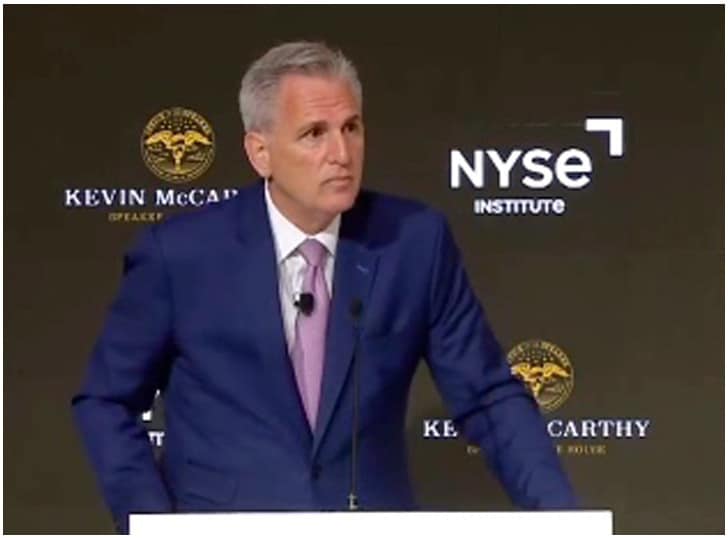House Speaker Kevin McCarthy (R-CA) took his case to factor spending cuts into debt ceiling negotiations to Wall Street on Monday.
“In the coming weeks, the House will vote on a bill to lift the debt ceiling into the next year,” McCarthy said in remarks at the New York Stock Exchange.
The Speaker said House Republicans’ forthcoming plan would seek to limit federal spending with proposals to return discretionary funding levels to 2022 levels “and then limit the growth of spending over the next 10 years to 1% of annual growth,” without “touching Social Security and Medicare.”
Negotiations between House Republicans and the White House over the debt ceiling have been going on sporadically since the federal government reached its $31.4 trillion borrowing limit on January 19, at which time Treasury Secretary Janet Yellen told Congress the country could undertake “extraordinary measures to prevent the United States from defaulting on its obligations.”
However, she warned that those measures would only buy the government enough time to keep from defaulting on its debt until “early June” if not sooner.
In February the Congressional Budget Office (CBO) said debt default would happen between July and September if the government did not act.
McCarthy and President Biden held their first discussion regarding the issue on February 1. Since then, Biden unveiled his annual budget proposal, which advocated raising taxes on Americans who earn more than $400,000 a year, and called on McCarthy to reveal Congress’ budget.
While House Republicans have not made public their own budget, McCarthy took the opportunity on Wall Street Monday to rail against Biden, saying, “For 75 days, the President has ignored the debt ceiling.”
If McCarthy accepts a compromise with Biden to prevent a default, he risks angering House Republicans to whom he made numerous promises in order to secure the Speakership. Among those promises was a vote on a 10-year balanced budget.
McCarthy appeared before Wall Street on the same day that Congress was set to return to work following its Easter Break.
Senate Minority Leader Mitch McConnell (R-KY), who returned to the Senate Monday following recovery from a head injury in March, stated in January that the debt ceiling fix “will have to come out of the House” while insisting, “America must never default on its debt. It never has, and it never will.”
Yellen has warned that a debt default could cause “irreparable harm to the U.S. economy.” Federally backed debt is the backbone of domestic and global markets. A failure to make good on U.S. borrowing could set off panic on Wall Street and spark millions of job losses.
“Household payments on mortgages, auto loans, and credit cards would rise, and American businesses would see credit markets deteriorate,” she said, adding that social security payments would also be in jeopardy.
According to Moody’s Analytics, a stock market plunge as a result of debt default could wipe out 6 million jobs and $15 trillion in wealth.
The United States has never defaulted on its debt. But it has repeatedly come close, perhaps most notably in 2011 amid the rise of the conservative tea party movement in the House, which resulted in the only credit rating downgrade in U.S. history.


